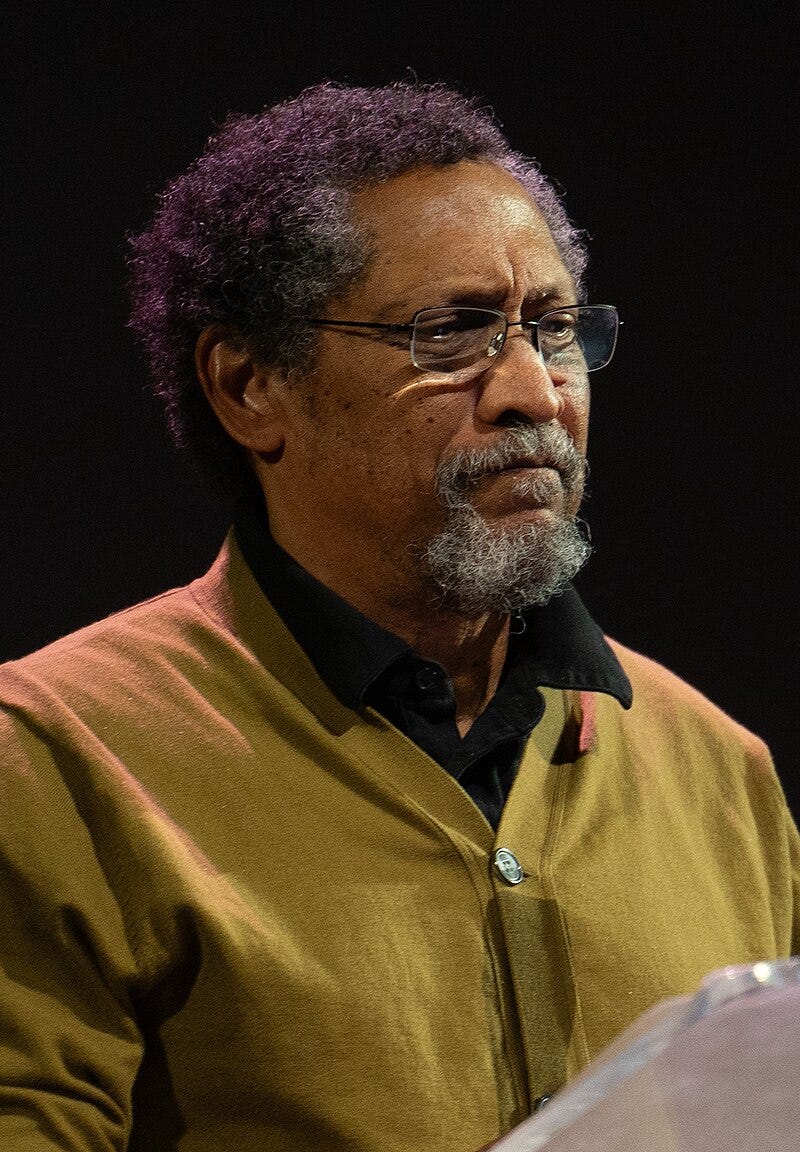The Great( and at times Stoically Decent) American Misanthrope.
Percival Everett deserves his place in literary history because of his understanding that, in life, you have to learn how to take a loss
I hadn't grown up enough to grasp Percival Everett when I first read him. Oh, I didn’t hate his work. Yet as an aspiring young respectability politician very much influenced by the highbrow PC politics of Barack Obama, I had no patience for the author’s cokehead ballplayers, and could take or leave the motivations of his existential Wyoming cowboy and broken townies. Even his major works wore me: as well and at times impeccably written as I Am Not Sidney Potier, Erasure, and Dr No were, I grew tired of his grifters, saps, and misanthropes by a hair.
It was when I shed the most insidious illusion of respectability politics, that it will protect you from ever losing in life, that I began to grow up and warm up to his work. In short, life had to kick my ass. had to get decked by heartbreak and loss, see the west and Northwest he wrote about, an rebuild myself when I realize that “Mr college personality” wasn’t gonna prevent me from living a rough adulthood, Age made me appreciate the searching and melancholic Humanity of the Mariner star in Soder, The Star-Crossed Hustler protagonist in grasping for a feeling close to love in Potier, the wistfulness of No’s main character and how he holds on try so hard to hold on to his dentist. All three are near masterpieces, grounded, grounded by how he could fuse his reluctant gifts for realism with madcap satire by playing both off of each other on the page( and playing them both in a deadpan narrative and structure). The novel is about
Yet my most drastic change toward Everett ca when I threw away my expectation of a main character to be a politician( which came from reading Erasure). The novel's protagonist is Thelonious “monk” Ellison, a writer and academic who is misanthropic enough to make Lewis Black look like Gumby. He has very real family problems, very real relationship problems, and very real and relatable career problems as a “literary black man”. When he sees a colleague.write a Push-like scam book, he decides to write “My Pafology” as a joke. It gets away from him… by becoming a huge hit. The bulk of the novel is him balancing his stoic family traumas and trying not to spin out of control as the book gets bigger( with many caustic takes on race and writing in the 20th century).
The glacial-pivot-like importance of Erasure is in how it course-corrected black men’s satire Many people mention Yellow Back Radio Broke Down and Mumbo Jumbo when they talk about Ishmael Reed and his social justice internet comeback. What they don’t talk about are the rape jokes in Louisiana Red, or his smirking at his Alice Walker archetype getting scalped in Reckless Eyeballing. Before Erasure, too much of the satire from brothers was made up of chauvinistic Berkeley bluebloods who could dish out a heap of punishment but could never take a lick of it. What gives Erasure its electric charge is that Everett Satirizes Ellison/Monk as much as any character on the page. He isn’t seen as an intimidating Caesar but a very human brother, gentle son, and human, but in the end flawed partner.
Compared to Erasure, I would suggest that the younger version of myself would have found James, his retelling of Huckleberry Finn from Jim's perspective, his masterpiece, because of his attitude, and the politics a younger version of me might have deemed correct. I would tell that younger version of me, that they would be half right and brutally half wrong: Right because it's politics are the politics of the human and not necessarily social justice per se, wrong because to focus on is politics discontent achievement and also discounts how Jim stoicism comes at a tremendous cost vis-a-vis the institution of slavery and the sacrifice( or not? ) he made for his son. More than any polemic, James' stiff upper lip and his ability to go on when he doesn't want to is the counter that the evils of slavery played themselves off of in the story, and ( especially with the ending) it accrues a devastating power.
On top of turning the traditions satire from black men on their heads, what Erasure and James have done is (along with John Edgar Wideman’s Two Cities, Edward P Jones’ The Known World and Colson Whitehead’s The Underground Railroad) is shift the expectations of the canonical black man novel away from a universe that was populated by Ralph Ellison and only Ralph Ellison (and I say this as a tremendous fan). That we have someone like Percival Everett writing them, someone this big, witty and alive, is one of the best pop culture stories in the first quarter of century.


